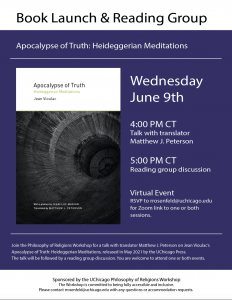The Idol and Modernity in Nietzsche and Marion
The Workshop on the Philosophy of Religions is committed to being a fully accessible and inclusive workshop. Please contact Workshop Coordinators John Marvin (johnmarvin@uchicago.edu) or T
The Idol and Modernity in Nietzsche and Marion (Paper)
Rethinking Luther’s Political Theology
Link
Kristof Oltvai
PhD Student, Philosophy of Religions
Rethinking Luther’s Political Theology
The paper may be accessed here.
Tuesday, January 25th, 12:30 PM, Swift 403
This workshop will focus on the pre-circulated paper and will be largely discussion-based. During the workshop, Kristof will present an expanded version of the first section (on Luther’s conception of the freedom of the conscience).
Hosted by the Philosophy of Religions Workshop at the University of Chicago.
The Workshop on the Philosophy of Religions is committed to being a fully accessible and inclusive workshop. Please contact Workshop Coordinators John Marvin (johnmarvin@uchicago.edu) or T
Rethinking Luther’s Political Theology (Paper)
Between Self and No-Self: Some Phenomenological Considerations
An Exegesis of the Absurd: Kierkegaard On Faith & Hegelian Philosophy
An Exegesis of the Absurd: Kierkegaard On Faith & Hegelian Philosophy
Swift Hall Room 403
This workshop will focus on a pre-circulated paper and will be largely discussion-based.
Please contact tjneenan@uchicago.edu for the paper.
_____________________
The Workshop on the Philosophy of Religions is committed to being a fully accessible and inclusive workshop. Please contact Workshop Coordinators John Marvin (johnmarvin@uchicago.edu) or Tyler Neenan (tjneenan@uchicago.edu) in order to make any arrangements necessary to facilitate your participation in workshop events.
THE ONE AND THE OTHERS
Andrew Cutrofello
Professor, Loyola University Chicago
THE ONE AND THE OTHERS: AN ESSAY ON SPECULATIVE ANTINOMIANISM
This is a draft of the second chapter of a work in progress called “The One and the Others: An Essay on Speculative Antinomianism.” In the book Andrew Cutrofello develops a way of thinking about antinomies. The book is structured as a series of responses to the antinomies presented in Plato’s Parmenides. In this chapter, Cutrofello focuses on the antinomies Parmenides deduces from the hypothesis “If the One is.” He contrasts Graham Priest’s characterization of such antinomies as true contradictions with Dante’s characterization of Christian paradoxes as merely apparent contradictions.
Tuesday, October 12th, 1:30PM CT
Lunch will be provided.
Swift Hall Room 403
This workshop will focus on a pre-circulated paper (available here) and will be largely discussion-based.
Please contact tjneenan@uchicago.edu for the paper password.
_____________________
The Workshop on the Philosophy of Religions is committed to being a fully accessible and inclusive workshop. Please contact Workshop Coordinators John Marvin (johnmarvin@uchicago.edu) or Tyler Neenan (tjneenan@uchicago.edu) in order to make any arrangements necessary to facilitate your participation in workshop events.
Protected: THE ONE AND THE OTHERS: AN ESSAY ON SPECULATIVE ANTINOMIANISM [PAPER]
Book Launch & Reading Group: Apocalypse of Truth: Heideggerian Meditations
Please join the Philosophy of Religions Workshop on Wednesday, June 9th for a talk with translator Matthew J. Peterson (PhD Candidate, Divinity School) on Jean Vioulac’s Apocalypse of Truth: Heideggerian Meditations, released this month by the UChicago Press. The talk will be followed by a reading group discussion, which will simply be an opportunity for those who have read the book to discuss it with others in the workshop community. You are welcome to attend one or both events.
Book Launch & Reading Group
Apocalypse of Truth: Heideggerian Meditations
Wednesday, June 9th
4:00pm CT
Talk with translator Matthew J. Peterson
5:00pm CT
Reading group discussion
Virtual Event
RSVP to rrosenfeld@uchicago.edu for Zoom link to one or both sessions.
The book may be purchased through the Seminary Co-op Bookstore or other booksellers.
About the book: We inhabit a time of crisis—totalitarianism, environmental collapse, and the unquestioned rule of neoliberal capitalism. Philosopher Jean Vioulac is invested in and worried by all of this, but his main concern lies with how these phenomena all represent a crisis within—and a threat to—thinking itself. In his first book to be translated into English, Vioulac radicalizes Heidegger’s understanding of truth as disclosure through the notion of truth as apocalypse. This “apocalypse of truth” works as an unveiling that reveals both the finitude and mystery of truth, allowing a full confrontation with truth-as-absence. Engaging with Heidegger, Marx, and St. Paul, as well as contemporary figures including Giorgio Agamben, Alain Badiou, and Slavoj Žižek, Vioulac’s book presents a subtle, masterful exposition of his analysis before culminating in a powerful vision of “the abyss of the deity.” Here, Vioulac articulates a portrait of Christianity as a religion of mourning, waiting for a god who has already passed by, a form of ever-present eschatology whose end has always already taken place. With a preface by Jean-Luc Marion, Apocalypse of Truth presents a major contemporary French thinker to English-speaking audiences for the first time.
About the translator: Matthew Peterson is a doctoral candidate in the philosophy of religions at the University of Chicago Divinity School. His writing has appeared or is forthcoming in Continental Philosophy Review and The Journal of Religion.
_____________________
The Workshop on the Philosophy of Religions is committed to being a fully accessible and inclusive workshop. Please contact Workshop Coordinators Tyler Neenan (tjneenan@uchicago.edu) or Rebekah Rosenfeld (rrosenfeld@uchicago.edu) in order to make any arrangements necessary to facilitate your participation in workshop events.

